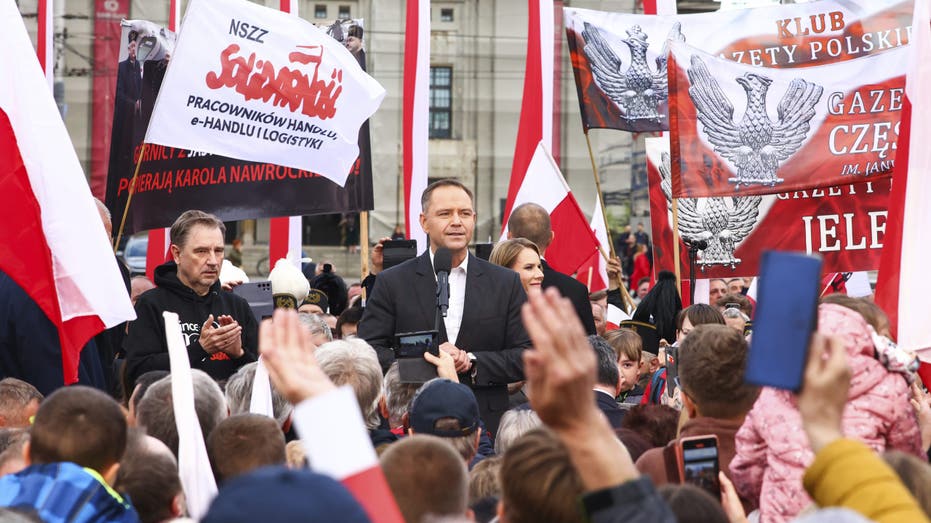Trump-Backed Candidate Aims to Win Polish Presidency in Crucial European Election
Political outsider Karol Nawrocki gears up to challenge Warsaw Mayor Rafał Trzaskowski in Poland’s upcoming presidential race.

As Poles prepare to vote in this Sunday's presidential runoff, international attention is converging on the tight contest between Warsaw mayor Rafał Trzaskowski and conservative challenger Karol Nawrocki. The race has evolved into a high-stakes battle not just for Poland’s political direction, but also for its foreign alignments and institutional balance of power, with global figures—most notably former U.S. President Donald Trump—casting a long shadow over the campaign.
Earlier this month, Nawrocki secured a high-profile meeting with President Trump in Washington, D.C., signaling deepening ties with conservative forces abroad. Furthermore, U.S. Homeland Security Secretary Kristi Noem traveled to Poland to endorse Nawrocki at a major conservative conference, declaring, “He needs to be the next president of Poland. Do you understand me?” The endorsement has energized Nawrocki's campaign, framing him as a candidate who would govern in the style of Trump and resist what conservative allies have described as the liberal drift of the current administration.
The significance of this runoff is heightened by a sense among many Poles that the nation sits at a geopolitical crossroads. With war raging across the border in Ukraine and Russia’s posture growing ever more aggressive, Poland’s leadership is under pressure to demonstrate both security and unity. As one senior policy analyst noted, "This is arguably the most important Polish presidential election since the end of communism."
In the first round of voting, Trzaskowski, who is backed by Prime Minister Donald Tusk and the governing Civic Platform coalition, secured 31.4% of the vote. Nawrocki, a relative political newcomer but prominent historian, performed strongly, finishing with 29.5%. Observers now consider the runoff a true toss-up, with the outcome likely to hinge on late-breaking developments and turnout.
Nawrocki’s candidacy reflects the aspirations of the Law and Justice party (PiS), which ruled from 2015 to 2023 and remains a potent force in Polish politics. He has promised a return to national sovereignty and a check against what PiS supporters describe as “unchecked liberalism” under Tusk’s government, which recently steered Poland back toward greater European integration after a period of tension with Brussels.
Although the presidency is nominally ceremonial, the president possesses crucial veto powers. This means that if Nawrocki wins, he could potentially derail key legislative initiatives of the current government. Conversely, a victory for Trzaskowski would likely smooth the way for Prime Minister Tusk’s policy agenda and consolidate Poland’s place within the European mainstream.
A prominent conservative adviser warned, “If Tusk’s candidate ends up securing the presidency, Poland’s tightened alignment with the EU will come at the expense of previously strong ties with the USA.” The concern is that losing the presidential veto would permanently alter the current duopoly in Polish politics and shift more national powers to Brussels and Berlin.
Under outgoing President Andrzej Duda, a close Trump ally, the veto was used to block progressive reforms in areas like judicial independence—moves that exacerbated friction with the EU but were championed by PiS as essential to defending Polish sovereignty. Nawrocki is expected to continue Duda's policies and serve as a bulwark against Tusk’s efforts to reverse years of conservative reforms.
Trzaskowski, for his part, offers a pro-European vision, supporting further integration with the EU, tighter ties with Berlin and Paris, and a focus on judicial reforms in line with European expectations. He has promised to be a constructive partner for Tusk’s majority, projecting an image of stability and predictability that is welcomed in Brussels.
Despite heated rhetoric around foreign alignments, both candidates are unlikely to disrupt Poland’s steadfast support for Ukraine. Since the beginning of Russia’s full-scale invasion, Poland has emerged as a key backer of Kyiv, providing billions of euros in military aid and sheltering over 1.5 million Ukrainian refugees. The Polish public remains broadly supportive of Ukraine, even as questions about the long-term costs of assistance linger on the campaign trail.
Immigration remains another contentious topic. While maintaining a tough stance on migrants from the Middle East, Poland has been far more welcoming to those fleeing Russian aggression, underscoring the ways in which regional security now dominates domestic debate.
European leaders are watching the outcome closely. A Nawrocki victory could become a stumbling block for advocates of deeper EU integration, particularly in Germany, where concerns about nationalist pushback are mounting. On the other hand, Trzaskowski’s ascension would likely be greeted as a green light for closer cooperation on rule of law, democratic governance, and regional security.
Ultimately, Sunday’s vote is being billed as existential for the future of Polish democracy and sovereignty, with its impact rippling far beyond Warsaw. Whether Poles choose pragmatism and closer bonds with Europe or a renewed emphasis on national sovereignty and transatlantic ties, the consequences will be felt throughout the region—and well beyond.




